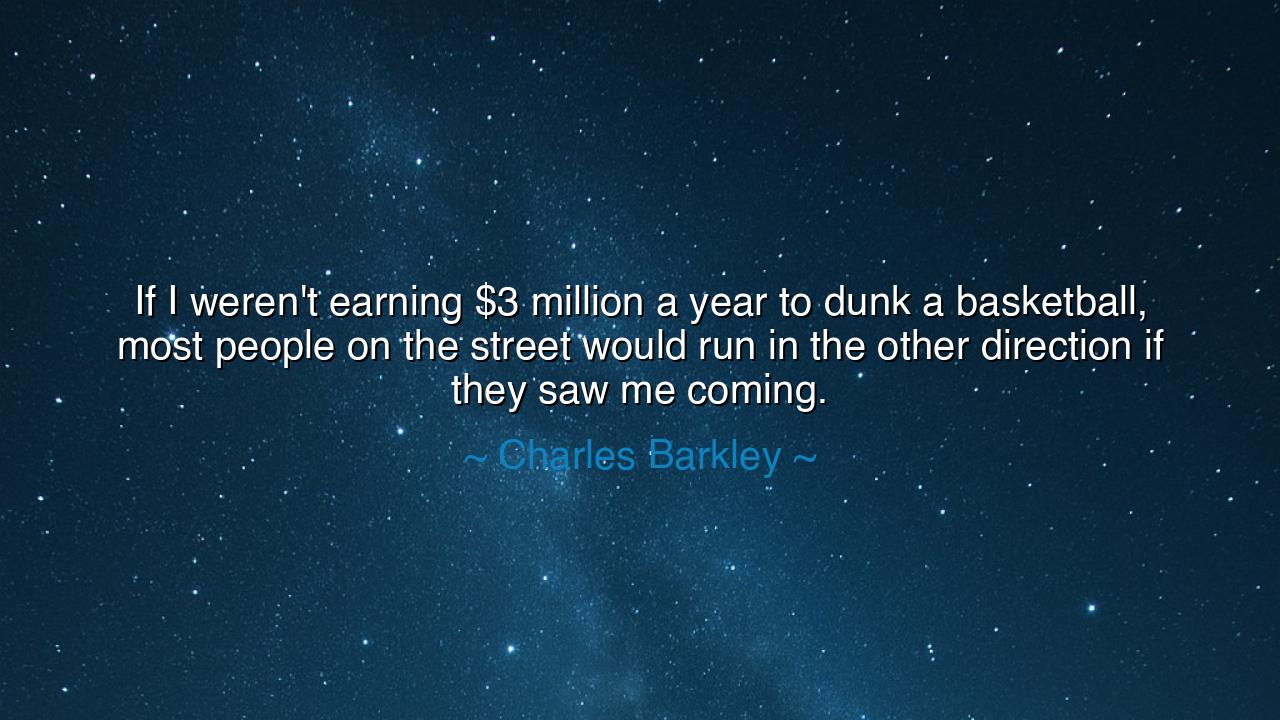
If I weren't earning $3 million a year to dunk a basketball
If I weren't earning $3 million a year to dunk a basketball, most people on the street would run in the other direction if they saw me coming.






When Charles Barkley, the bold warrior of the hardwood, proclaimed, “If I weren’t earning $3 million a year to dunk a basketball, most people on the street would run in the other direction if they saw me coming,” he stripped away the illusions of fame and revealed the raw truth about how society sees its heroes. With these words, Barkley—known as much for his candor as for his power in the paint—confessed that his celebrated image was not entirely his own creation, but a product of wealth, spectacle, and the reverence people bestow upon athletes. Behind the applause and the bright lights, he recognized the darker truth: that without the game, without the millions, without the uniform, he might be seen not as a hero, but as a threat.
The origin of this truth lies in Barkley’s life and times. He was a player who towered on the court not only for his strength but for his voice, never hiding from uncomfortable realities. Barkley grew up in the deep South, in a world scarred by inequality and suspicion, and he knew firsthand how appearance shapes perception. On the court, his size, power, and charisma brought admiration. Off the court, those same qualities—his physical presence, his blunt speech, his boldness—might provoke fear rather than respect. In his words is a reflection of society’s double standard: how context transforms one man into either idol or outcast.
The ancients, too, understood this paradox. A warrior in armor was hailed as savior when he defended the city, yet feared as a brute when he walked alone among the people. Reputation, wealth, and role shape how a man is judged more than his true character. Barkley’s words remind us of this timeless truth: that human beings often worship the mask, not the man. The $3 million paycheck and the slam dunks earned him applause—but remove those, and prejudice might have turned admiration into avoidance.
Consider the story of Jack Johnson, the first African American heavyweight champion of the world. In the ring, he was celebrated as nearly unbeatable, a master of strength and skill. But outside it, he was reviled, hunted, and feared by many simply because of his color, his defiance, and his unwillingness to bow to the order of his time. Like Barkley, Johnson lived the paradox of public perception: cheered for what he could do, but condemned for who he was. Both men reveal the same lesson—society’s vision is fickle, and admiration can vanish once the stage is gone.
The lesson here is clear: we must not allow ourselves to be deceived by the trappings of wealth, fame, or status, nor should we measure others by such shallow standards. A man’s worth is not defined by whether he earns millions or whether crowds roar his name. His worth is found in his courage, his character, and the truth of his deeds when no one is watching. Barkley’s humor carries a weighty warning: if the world admires you only because of what you produce, then the admiration is not for you at all—it is for the spectacle.
What, then, shall we do? First, seek to know others beyond their masks. Do not let uniforms, titles, or wealth blind you to the soul within. Second, build your own value not only on what you earn, but on who you are when stripped of status. Let honesty, kindness, and courage be the foundations upon which your life stands. Third, extend compassion to those the world casts aside, remembering that had fate shifted slightly, even the most admired might have been the most feared.
Thus, Barkley’s words endure as more than a joke—they are a mirror held to society: “Most people on the street would run in the other direction if they saw me coming.” He reminds us that perception is fragile, that fame is a fickle garment, and that true dignity must be built upon something deeper than applause. Let us, then, live in such a way that even if the lights dim and the wealth fades, we remain steady, respected not for the mask we wear, but for the truth of the spirit within.






AAdministratorAdministrator
Welcome, honored guests. Please leave a comment, we will respond soon